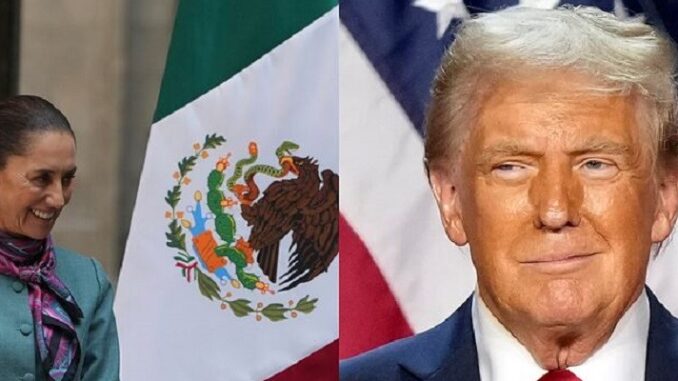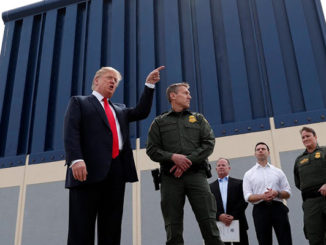
Mexico is banking on its ability to negotiate with a deal maker like Donald J. Trump, and many officials say the country is better prepared and has more leverage than it did during his first term.
Natalie Kitroeff, NY Times
On his path to the presidency, President-elect Donald J. Trump consistently made Mexico a target. He threatened extreme tariffs on the country’s exports to the United States and vowed to carry out mass deportations. He even challenged Mexican sovereignty by proposing military strikes against drug cartels there.
Those warnings would likely set off alarm bells in many countries. But Mexico’s leaders aren’t panicking — in fact, some of them see opportunity in Trump’s return to the White House, according to six current and former officials, some of whom were not authorized to speak publicly.
Mexico is banking on its ability to negotiate with a deal maker like Mr. Trump. And while the government is taking Mr. Trump’s threats seriously, and while there is concern over some of his cabinet nominees, the officials say the country is better prepared than it was during his first term.
President Claudia Sheinbaum of Mexico has said that her government “will look to contact President Trump’s transition team before he enters” the White House. The goal of those talks, officials say, would be to reach agreements on key issues ahead of the inauguration in January.
The Mexican government has spent months drawing up plans for dealing with everything from trade to security to the border, they said, in order to head off any potentially extreme proposals the new administration might consider.
“There’s no reason to worry,” Ms. Sheinbaum said the day after the U.S. election. “We will establish communication and good relations.”
Some of the positive messaging could be posturing, to calm markets and downplay the true extent of the risks for the country. But Ms. Sheinbaum and her aides were certainly not surprised by Mr. Trump’s victory.
Her team has been gearing up for the return of the former American president since before she was voted into office in June, reading books by former Trump officials and making contact with key people in his orbit.
“We’ve already been on this for several months, because it was the scenario we anticipated,” Marcelo Ebrard, Ms. Sheinbaum’s economy minister, said at a recent public forum, referring to Mr. Trump’s win.
Mr. Ebrard dealt directly with Mr. Trump and his team as foreign minister under Mexico’s former president, Andrés Manuel López Obrador, and will help lead a review of the United States-Mexico-Canada trade agreement set for 2026.
Mr. López Obrador and Mr. Trump had what both men describe as a very good relationship, owing in part to the former American president’s willingness to stay out of Mexico’s domestic affairs, beyond demanding its help securing the border between the two countries.
Mr. Ebrard said at the forum that “Mexico would never accept an intervention of any kind on its soil.”
Some Mexican officials said that they could satisfy Mr. Trump’s demands by pushing to make high-profile arrests of cartel leaders and taking other action to dismantle fentanyl networks. They argued that the president-elect’s focus on the criminal networks could even be beneficial, by creating some additional pressure on the nation’s security forces to ramp up the fight against the groups, as a way to help protect the country’s economy from American tariffs.
Much remains murky about Mr. Trump’s deportation plans, and Mexican officials are well aware that if he is able to expel millions of undocumented Mexicans, it could put a strain on the country. But Mexico has also put itself in a good position to withstand any immediate fallout from harsh new border measures.
Mexico’s migration enforcement efforts drove down border traffic in recent months, and some top officials say a crackdown by Mr. Trump would further deter migrants from making the journey to the U.S. border, at least in the short term, lessening the pressure on Mexico.
Today, migrant shelters on the Mexico side of the border are only about half full, according to government data shared with The New York Times, meaning there is room to house migrants, if necessary.
The government also sees a path to negotiating deals to avoid tariffs on Mexican exports to the United States, officials said. Some within the Sheinbaum administration are calculating that it would be too costly for Mr. Trump to simultaneously wage a trade war against both China and Mexico, the top two exporters to the United States last year.
“There are significant, at least stated, threats — but I think we have advantages,” Mr. Ebrard said at the forum. One of those strengths: American businesses with investments in Mexico.
“The number of companies close to him with an interest in things going well with Mexico is enormous, starting with Tesla,” Mr. Ebrard added. Tesla announced it would build a gigafactory in northern Mexico last year, though Elon Musk said this summer he was pausing the plans because of the possibility that Mr. Trump would put tariffs on Mexican-made cars. Mr. Ebrard recently said he would meet with Mr. Musk to discuss the investment.
The nominations of China hawks like Senator Marco Rubio of Florida as secretary of state and Rep. Mike Waltz of Florida as national security adviser have solidified the sense in Mexico that the administration is focused on confronting Beijing.
Unlike China, a geopolitical adversary of the United States whose containment is seen as a national security priority, “we are strategic and almost inevitable allies,” said Gerardo Esquivel, an economist and former member of Mexico’s Central Bank, who advised Ms. Sheinbaum’s campaign.
“Contrary to the conventional wisdom, I think the arrival of Trump could even be a positive thing” in economic terms, Mr. Esquivel said.
Many companies have already moved plants from China to Mexico in recent years, and Mr. Esquivel said those that postponed those decisions may “accelerate the process of relocation,” which would be a boon to the Mexican economy.
On migration, Mexican officials expect steep demands from Mr. Trump, including possibly absorbing a wave of deportees and accepting the return of the “Remain in Mexico” policy, first implemented in 2019. The measure required tens of thousands of asylum seekers many nationalities to wait south of the U.S. border while they applied for status in the United States.
“Having Trump back for deterrence, it’s true that it might get easier, but the asks are going to be harsher,” said Arturo Rocha, a former immigration official at the Mexican Foreign Ministry under Mr. López Obrador. Still, Mr. Rocha said, Mexico has significant experience reintegrating deportees and other returned migrants.
“We are ready to cope with migrants,” he said. “We can pull it off, we have a model to do that we have operations that work well.”
Other than the United States, the place perhaps most affected by the surge of migration under the Biden administration was Mexico. The country had to contend with millions of new arrivals and enriched criminal smuggling networks, while doing the difficult work of enforcement that many saw the U.S. government as outsourcing to its southern neighbor.
“The large number of people coming to the U.S. border was partly a function of the Biden administration postponing tough choices about asylum,” said Andrew Selee, president of the Migration Policy Institute, a Washington-based nonpartisan research organization.
“Trump is going to apply maximum pressure on undocumented migrants and it will discourage people from coming, at least for a while,” Mr. Selee added.
Migration officials in Mexico say they will draw on their considerable experience dealing with a rush of deportations, including under the Obama administration. President Barack Obama deported more than three million people in total, with average yearly deportations outpacing those under the Trump administration.
“This is nothing new,” said David Pérez Tejada, a former top immigration official in Baja California state. He said it was “a situation that we have navigated and tackled before and we won’t have any inconvenience dealing with it again.”
Ms. Sheinbaum said she hoped any deportations wouldn’t affect remittances sent by migrants to their families living in Mexico, which soared to more than $60 billion last year.
“We are reinforcing our consulates,” the president said recently. “To our brothers and sisters in the United States, we will always defend you.”
.
Natalie Kitroeff is the Mexico City bureau chief for The Times, leading coverage of Mexico, Central America and the Caribbean.



